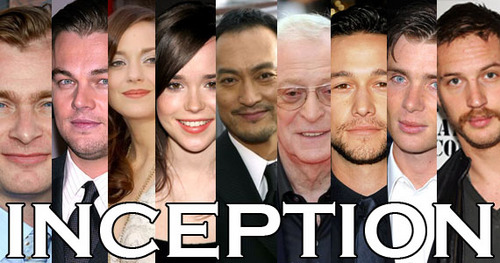ay, there’s the rub.”
I have a friend in Charlotte who records all his dreams in a dream journal. He loves to try and ponder what the heck is going on in his brain when he doesn’t have it on a short leash. The problem of course is that dreams are often more appealing than reality, and this is one of the themes of Christopher Nolan’s (previous work—Dark Knight) new psychological thriller called ‘Inception’. Dreams have always fascinated human beings, and they have always been seen as vehicles of important messages, sometimes from God, sometimes from the human subconscious (see Freud), sometimes from who knows where. Dreams are not insubstantial things, they are often the things that pre-occupy us, and sometimes guide or goad us in particular directions. And always, they are revealing of our inner selves.
In this 2 hour and 22 minute PG-13 epic, we encounter not only a film full of powerful ideas (like you can change somebody’s mind by implanting the seed of an idea in their brain through an idea inserted within a dream), but also a film full of powerful performances (especially by Dicaprio and Page and the cameo by Michael Caine is excellent as well), interesting plot twists, and the most visually arresting scenes in slo-mo since The Matrix that I have encountered.
One of the keys to understanding this highly philosophical and complex film is that the mind has various layers, indeed the subconscious has multiple layers, and you will need to keep track of the differing layers of the dream in the last 30% of this film if you are going to make sense of it. This is one of those films that invites, if it does not require repeated viewings, and one is never totally sure whether the segment one is currently watching is real or a dream. But that is part of the charm of the film, as it forces you to explore the boundary between reality and dreams, or better said dreams as a part of our reality, even if only in the mind. But there is more. This film also raises the issue of what makes for mental health, and problems that dreams and guilty conscience’s can cause us.
The Bard, in Macbeth has a character ask—– “Canst thou not minister to a mind diseased, pluck from the memory a
rooted sorrow, raze out the written troubles of the brain, and with some
sweet oblivious antidote cleanse the fraught bosom of that perilous
stuff which weighs upon the heart?” In one of the most powerful moments in Inception, Cobb, the main character is told that the way forward to better mental health, and letting his deceased wife go is ‘to forgive yourself’. Perhaps you will understand better if I share just a shard of the plot.
The most fundamental idea in this film is that there is now a process through drugs by which one can go into a person’s mind and either ‘extract’ some information (called ‘extraction’) or plant an idea in that mind (called ‘inception’). I doubt this is really possible, but it is the premise of the film, and in the film, Cobb works for a company that uses this technique in a panoply of situations to serve their clients. In our film, they are doing this to a certain heir to a huge energy company named Mr. Fischer, to head off the disaster of one mega-company controlling most of the world’s energy for its own profit and purposes. The trailer which I will post in a separate post will give you a feel for this impressive film, all the more impressive when you compare it to the drivel we have been mostly been served up this summer.
I would encourage anyone who appreciates a film that really makes you think, as well as entertains you and surprises you and thrills you, to go and see this film, and see what you think. It simply proves that the psy-fi thriller genre is by no means dead, and hopefully this film will be successful enough to generate some more efforts in this direction.

